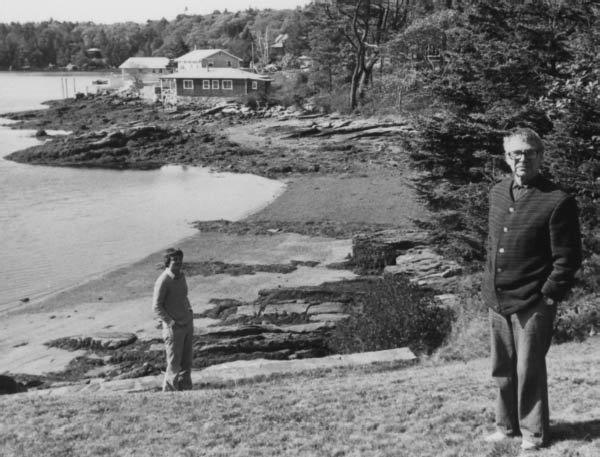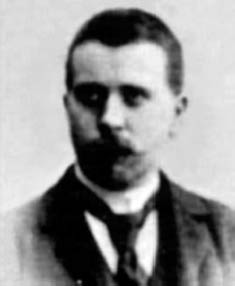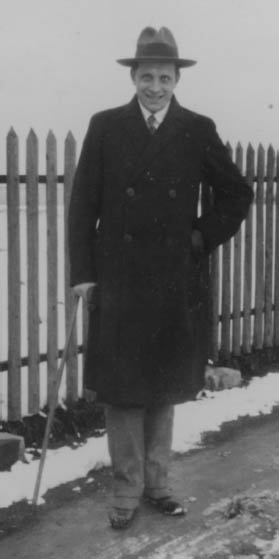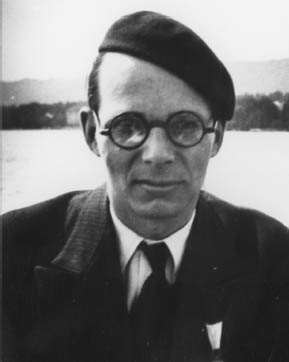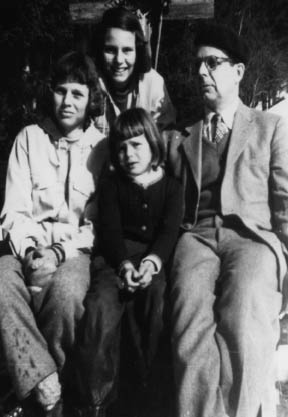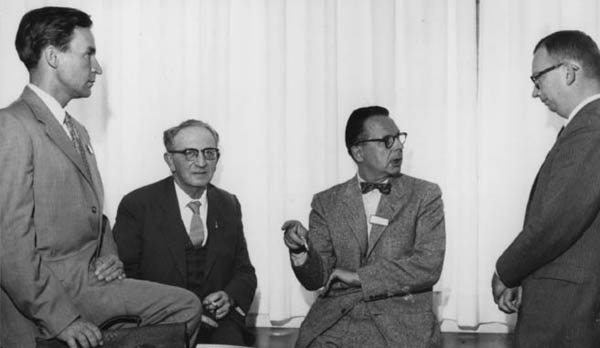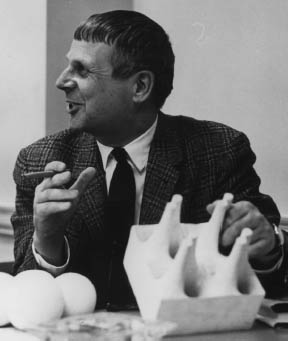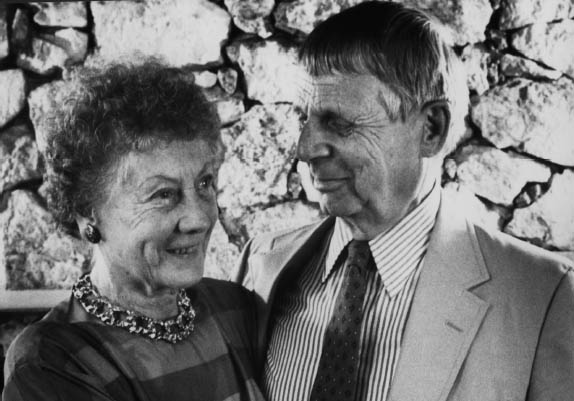One
Lars V. Ahlfors
Lars Valerian Ahlfors (1907–1996) was born in Helsinki, Finland, and earned his PhD at the University of Helsinki under Ernst Lindelöf in 1928. In 1935 he came to Harvard University for three years but then returned to Helsinki to help carry on its mathematical tradition. Forced to leave by World War II, he accepted a professorship at Harvard, where he worked until his retirement in 1977. Ahlfors is remembered by his students and colleagues as refined and reserved, yet a delightful host fond of good food, drink, and conversation—and always eager to work the following day.
Ahlfors’s work virtually defined the subject of complex function theory in the middle half of the twentieth century. His textbook Complex Analysis has attracted generations of students to the subject. In his research papers he introduced and developed the theory of quasiconformal mappings, for which he received a Fields Medal in 1936. In collaboration with Lipman Bers he made pioneering advances in the theory of Kleinian groups, and Ahlfors’s contributions to geometric function theory underlie much of modern complex manifold theory. The breadth and depth of his work are shown by his being the only mathematician ever invited to give three plenary addresses to International Congresses of Mathematicians.
The Boy Who Loved Homework
MP: Ahlfors is a Swedish name. Did your parents come from Sweden and settle in Finland?
Ahlfors: Oh, no! My father was born on the Åland Islands, which is a part of Finland but has a Swedish population and is completely Swedish-speaking. My ancestors came to Mariehamm in the Åland Islands from Björneborg, a smaller city on the mainland. I think that some of them were sea captains with sailing ships that traded all over the world. My grandfather had a grocery store, and he must have done fairly well because he was able to send his children to school on the mainland. This was good since there were practically no schools on the Åland Islands. That’s how my father was able to become first an engineer and then a professor of engineering at the Polytechnical Institute in Helsinki.
MP: What do you remember about your mother?
Ahlfors: I didn’t know her at all. She died in childbirth. When I was a newborn, I was sent to the Åland Islands to be taken care of by two aunts. At two or three I was sent to my father in Helsinki. At that time a professor’s salary was excellent, and we had lots of money. I remember the days when we had a maid, a cook, and a governess. Who can do that on a professor’s salary today? On the other hand, the domestics were paid very little.
MP: What was your father like? As a professor of mechanical engineering, he obviously had some mathematical ability.
Ahlfors: He was very stern. Yes, he did have some mathematical ability. When I was about twelve or thirteen, I would make clandestine visits to his engineering library at home, to find mathematical books.
MP: When did mathematics become particularly interesting to you?
Ahlfors: As a young boy. When I was three or four, my father started to ask me mathematical questions, and I had to give the answers quickly. So it was quite obvious that at an early age I had a special sense of mathematics. I was fortunate in having two sisters who were two and three years older. I followed their mathematical education, and I loved to do their homework. So that’s the way I slowly began to know some mathematics.
Figure 1.1 Ahlfors (right) and Trols Jorgensen on the lawn of his Maine cottage.
On the other hand, I was not given any books on mathematics. My father did not press me in any way at all to move ahead of what I was supposed to do in class. Unfortunately, the level of mathematics in my school and even in high school was not very advanced. No calculus was taught. In fact, the teachers used me to make up new problems.
MP: Was that true throughout Finland?
Ahlfors: No. Some schools offered advanced mathematics, but not the one that my father sent me to. It was a private school that was supposed to be better in some ways—in particular, it was extremely good in languages. When I left Finland for the first time and traveled to Berlin, I could understand everything. I had an excellent sense of grammar, so I could speak correct German fluently straight out of school.
MP: You studied languages over a period of four years?
Ahlfors: Something like that. You see, first I went to a Swedish-speaking school, but everybody had to study Finnish from the start. So quite young I had at least an idea of Finnish—although that is not enough to learn Finnish!
MP: Were sports an interest of yours in school?
Ahlfors: None whatsoever! I hated sports. I also hated vacations and Sundays, for I had nothing to do on those days.
MP: Many Scandinavians love to go up to the mountains.
Ahlfors: Not I. I loved what you would call the homework exercises in my school courses. I also had access to books. I was not taught calculus, but I learned it from my father’s engineering books.
MP: Apart from mathematics, were there subjects that particularly interested you?
Ahlfors: I worked hard on languages. I did not like history. Why memorize the years associated with various events and people? One might just as well memorize telephone numbers. It didn’t make any sense to me, and it seemed rather silly. My history teacher was not very fond of me.
MP: Given your interests, and your father’s prompting, was it almost preordained that you would end up in mathematics?
Ahlfors: Oh, yes, I think so. It became absolutely clear to me one day when I was about fifteen, as I was walking in Helsinki with my father. We met the only full professor of mathematics at Helsinki University, and he and my father politely took off their hats as we passed. Then, using my family nickname, my father said to me, “That is what you should become, Lasse. You shall become a professor of mathematics.”
MP: Your father must have been quite aware of your leanings.
Ahlfors: Yes, he was. He had wanted me to become an engineer, like himself, but had soon found out that I could not do anything mechanical, not even put in a screw. So he decided that I should go into mathematics.
Discovering Real Mathematics
MP: The mathematician whom you met on your walk, was that Ernst Lindelöf?
Ahlfors: Yes, Lindelöf—the father of mathematics in Finland. In the 1920s all Finnish mathematicians were his students. He was essentially self-taught.
Figure 1.2 Ernst Lindelöf was the thesis advisor of both Ahlfors and Nevanlinna. Ahlfors dedicated his classic text, Complex Analysis, to him.
MP: Did he teach you?
Ahlfors: I was very lucky when I finally came to the University, for I started out with two great teachers, Lindelöf and Rolf Nevanlinna. I don’t believe I’ve had better teachers. I was seventeen when I entered the University, and I had carefully read all the information for new students, which said not to be afraid to ask the professors questions. So I’m afraid that I asked a lot of questions! I have had students of my own who abused this privilege. But I was the best as far as the professors were concerned, and they were very good to me.
I took advanced calculus as a freshman, which I was not supposed to do. On the first day of school, when I went to Nevanlinna to ask permission to take his course, he asked me, “Do you know any calculus?” “Oh, yes,” I said, “I have studied calculus.” I didn’t tell him it was all on my own. Lindelöf did not like my jumping ahead, and he made me take all of the tests from the prerequisite courses that I had not attended. I liked advanced calculus; I was very interested in my work.
MP: The original calculus that you learned must have been computationally oriented, so you essentially learned techniques. Was that in fact helpful? Some people believe that when it comes to looking at analysis and really understanding the theory, it’s a great benefit to know the mechanics.
Ahlfors: I would not say that it is bad to start with the mechanics of calculus. On the contrary, one must have a lot of technique even to learn calculus.
MP: During those years with Lindelöf and Nevanlinna, how much complex analysis did you get?
Ahlfors: Well, it was not possible to have a full set of advanced courses each year at Helsinki because there were too few professors. So one course was given one year and another the next year, and so on. Thus, one depended very much on what was offered, but because of Lindelöf, complex analysis had already become a special subject for the Finnish mathematicians. I began studying it in my second year.
During my first year, Lindelöf told me that something strange had happened: Nevanlinna had been invited to Zürich to substitute for Hermann Weyl, who had gone to America for a year. Lindelöf said I must try to go to Zürich to hear Nevanlinna lecture. So that’s what I did!
Zürich was my first encounter with mathematics as it should be taught. It was contemporary mathematics, not the history of mathematics as our courses usually were. In Zürich Nevanlinna could talk on the research level, which made a completely different impression on me. I came to understand what mathematics was about and that I was supposed to do mathematics, not just learn it. This had not been clear to me before.
MP: Was Pólya at Zürich when you were there?
Ahlfors: Yes. Pólya was perhaps the most interesting person at Zürich. He led the seminar, which of course was very good—but he had strange ways of doing it.
Figure 1.3 Rolf Nevanlinna, a great influence on Ahlfors.
Hearing about unsolved problems is what really kept me going. Early in my stay, I had the good luck to solve the Denjoy conjecture, so I became a known mathematician right away. It was not so terribly important, but it was new, and it showed the way to other things.
MP: You were still very young then.
Ahlfors: I was twenty-one. I followed Nevanlinna to Paris for the spring term after my term in Zürich. That’s why I really worked a lot on his theories. In Paris I also got to meet Denjoy. He told me that now he knew why twenty-one is the most beautiful number: because twenty-one years ago he had made this conjecture, and when I was twenty-one I had solved the problem.
Helsinki to Harvard
MP: Most young men of twenty-one have few obligations—no wife, children, and so on. And having made a name for yourself, you were able to travel around and talk to people more easily. Was this why it took a few years to complete your dissertation?
Ahlfors: Well, since I was on my own, I could sit up half the night and work. But my dissertation developed into a rather important paper because it used the same methods that I had used in the Denjoy conjecture, although a much broader aspect of them. Also, upon my return to Finland in the fall of 1929, I was made a lecturer at Aaboe Academy in Turku. It was like a small university, Swedish-speaking, and I taught there for three years. Since I did not care for Turku, I commuted to Helsinki.
MP: Do you like to teach? Is it fun for you?
Ahlfors: Yes, I like to teach. It’s not the same as doing mathematics; you have to think about the subject from a different angle. For one thing, you teach things that were done by others and that you have not done yourself. Also you must empathize—think about what the students really need to learn and how they should be taught. I’m not saying that I’m a terribly good teacher, but I certainly enjoy teaching.
Figure 1.4 A young Ahlfors with a look of determination.
Figure 1.5 Ahlfors was fond of berets.
MP: Where did you go after Aaboe Academy?
Ahlfors: The next step for me was a position at Helsinki University. Then I got a Rockefeller grant for an academic year in Paris, which was a great experience for me. Then in 1935 I went to Harvard.
MP: How did you react to Harvard?
Ahlfors: I liked it from the start—not only the mathematics but the whole atmosphere. It was excellent. The department was extremely friendly. It was like a big family, which my wife especially appreciated. The Depression was still on in America, but Harvard paid me $3000—an enormous amount of money at that time.
Mrs. Ahlfors: William Caspar Graustein, a Harvard mathematics professor, made $9000, and I asked him, “What do you do with so much money?”
Ahlfors: You could travel all over the world and rent golden Cadillacs!
MP: Of course, Harvard was the leading American institution.
Ahlfors: Yes. Many of the others were quite poor. But for years now, Harvard has not seen that being a leading institution is a reason to pay people well. They used to say Harvard stands for excellence, and you can’t get excellence unless you pay for it. But then they decided that excellence was too expensive. Somehow it fell down quite a bit.
Mrs. Ahlfors: And of course we also had the “gravy train.”
Ahlfors: Oh, yes; one could have additional gravy by repeating one’s lectures for Radcliffe students. They were not allowed to hear lectures at Harvard, but the professors were allowed to give their lectures at Radcliffe and were paid $1000 extra per year. So in my second year, I was already at $4000.
MP: When you arrived at Harvard, who was the chairman of the mathematics department?
Ahlfors: Graustein. He told my wife that he had written to the noted mathematician Constantin Carathéodory for advice about whom to invite to Harvard, and Carathéodory wrote back: “There is a young Finn, Ahlfors, and you should try to get him.”
MP: Yet it must have been difficult to leave Finland.
Ahlfors: Well, we were a little bit homesick. We agreed to a mutual probation period of three years, which was just about right. And then in 1938, when the three years were over, my teacher Lindelöf sent a letter saying that Finland can export goods, but not intelligence. He asked me to come home.
Figure 1.6 Ahlfors in lecture mode.
Figure 1.7 Constantin Carathéodory.
Papa in Wartime
MP: In 1938, when you went home to Finland, Europe was already beginning to break apart.
Ahlfors: We had one very, very happy year in Finland, but then in 1939 came the war. Yet I would not have wanted to be in America when Finland was at war.
MP: With so many real dangers in most parts of Europe during the war, I am impressed that people stuck it out.
Daughter: There was no place to go.
Ahlfors: Being a Finnish citizen, I was never in the military service, but I was still considered eligible for special service.
Daughter: Tell what you did during the war, Papa.
Ahlfors: Well, I answered the telephone.
Mrs. Ahlfors: But it never rang.
Ahlfors: No, it never rang! Actually, I was one of three mathematicians assigned on eight-hour shifts to watch a telephone twenty-four hours a day. We were in a shelter that couldn’t easily be bombed, a rather safe place. If everything went wrong, then we were to be connected with military headquarters in order to code their messages. But nothing ever happened.
MP: In 1945 you decided to return to Zürich. Was it difficult to leave Finland at that time?
Ahlfors: Normally I would not have been allowed to leave at all, since I was a Finnish citizen. But my health was not in the best condition; I have an irregular heartbeat. My doctors said that I needed to go to Sweden, which was also good for my family.
MP: So they were able to come with you. Did anyone realize that you were intending to leave Finland?
Ahlfors: Everybody knew. Nevanlinna was one of the first to know it, and he encouraged me to leave because everyone realized that it would be a long time before conditions in Finland would again be normal so that one could do serious research.
MP: How did you get out of Sweden?
Ahlfors: Sweden was neutral in the war, but getting from Sweden to Switzerland was very hard. Finland had already made an armistice with Russia and was at war with everybody else—both the Allies and Germany. So the Germans would not let us fly over Germany, but the Russians would not let us fly over, either.
Although officially Finland was at war with England, the British decided to help us. There were American military planes that had been shot down in Sweden and then repaired and put back into service. They flew between Stockholm and an airfield in Scotland—but only on nights with no moon and at a high altitude, up in the stratosphere. We had to use oxygen masks all the time, which was not easy with small children. They also warned us that if we were shot down and landed on the water, we would have to get out on the wings.
After getting to England finally, we then had to cross the English Channel to France. But waiting for the boat-train took a long time. We would take everything to the train station, where we sat on the train, waiting for the boat. At last they would come and tell us that there was no boat that night, and we would go back to the hotel. This was repeated perhaps ten times, until finally one day the boat came and the train truly left. This was in early 1945. London, of course, was being bombed by the V-2s, and the children were very scared. When we crossed the English Channel, everybody had to put on life jackets. The children argued, “If there is no danger, why do we have to put them on?” And then, on the train from Paris to Zürich, we were bombed by the Germans all the time.
MP: You really wanted to get to Zürich.
Ahlfors: We certainly wanted to get to Zürich, and the Swiss wanted us to come, too.
MP: How did the British decide who was sufficiently important to take one of their special high-altitude flights from Sweden?
Ahlfors: I think that the Swiss laid diplomatic groundwork for people all the time. In fact, they had even contacted hotels in London and in Paris to accommodate us when we arrived. In Paris, we stayed in the George V, which is the most fantastic hotel I have ever seen. It was quite inexpensive for us, because in those tumultuous times nobody knew what money was worth. I had British pounds, and no one in France knew how many francs to exchange.
Finally, we got to Zürich, and a year and a half later, I was asked to come back to Harvard. When Hermann Weyl heard that I was in Zürich, he understood that I no longer felt a patriotic reason to stay in Finland. So he let Harvard know that they should try to get me.
The First Fields Medal Winner
MP: Back in 1936 you were still at Harvard, so they could claim you at the International Congress of Mathematicians in Oslo that year. That was the first time the Fields Medals were awarded, and you were the first winner. Did you have any prior knowledge of this honor?
Figure 1.8 Ahlfors with his three daughters in the Austrian Alps in the early fifties.
Figure 1.9 Giving away his daughter Cynthia at her wedding in Paris.
Ahlfors: I learned of it only a few hours before receiving it. I don’t know what would have happened if I had decided not to go to Oslo! George Birkhoff of Harvard knew about the Fields Medals, so he probably would have done something about it if I had said that I was not going.
MP: In 1936, a Fields Medal had no special significance yet.
Ahlfors: No; people did not know what it was. Although I felt very honored, I thought that there must have been somebody better than I who deserved it. Now I am not so sure: my competitors had not reached their heights then; they were not sufficiently well known.
MP: What, if anything, has the Fields Medal meant to your career?
Ahlfors: Oh, quite a bit—though not so much in the beginning, I must say. When I returned to Harvard I was hired as only an Assistant Professor. That would never happen anymore.
MP: But Harvard was still very pleased that you won.
Ahlfors: Oh, yes. I was very pleased, too. It certainly helped me when I wanted to get away from Finland because of the war.
MP: Did the Fields Medal also make a positive contribution to your career later?
Ahlfors: I did not take it too seriously at the time. Actually, I was not sure at all whether it was a good idea. But I think that it has turned out to be one.
MP: Why do you think the Fields Medal is a good idea?
Ahlfors: Because it keeps mathematics on a very high level. I really think that it spurs people to try hard. Possibly the same people would do the same mathematics whether or not the Fields Medal exists, but I think that letting people know that they are good can be quite important for how they work.
MP: What do you think of comparisons with the Nobel Prize?
Ahlfors: It is strange that it is sometimes referred to as the “mathematical Nobel Prize.” It is not a prize because there is no money. I would have welcomed $100,000! I did get the Wolf Prize, and that was a good one—$50,000. And I got a prize in Finland that allowed me to buy my summer home in Maine.
It is probably a good thing that there is not a Nobel Prize in mathematics. Since they have to pick a winner every year, they would run out of good mathematicians, I’m sure. Certainly for economics, which was not one of the original Nobel Prizes, they have to scrape the bottom of the barrel.
MP: What other personal benefits have you had from winning the Fields Medal?
Ahlfors: I can give one very definite benefit. When I was able to leave Finland and go to Sweden, I was not allowed to take more than 10 crowns with me. So what did I do? I smuggled out my Fields Medal, and I pawned it! I’m sure it is the only Fields Medal that has been in a pawn shop.
MP: Did you get it back?
Ahlfors: Oh, yes. As soon as I got a little money some people in Sweden helped me retrieve it.
Doing Mathematics
MP: How do you do mathematics? Do you use geometric images? Your subject is certainly geometrical.
Ahlfors: Well, the way I do it has changed over time. Of course, the nature of the problem changes. And it becomes harder and harder when one gets older; it’s just not quite so easy anymore. I have always relied very much on the subconscious. One works, and works hard, but one does not really discover anything while working. It is later that one makes discoveries.
I still do mathematics in bed. When I wake up in the morning, I think much more clearly than at night. In the morning everything in my system runs better! Sometimes, of course, when one gets an idea, it’s not very good; but one has to take the bad with the good.
Figure 1.10 Ahlfors taking a break at a mathematics meeting.
MP: Do you think in geometric images, or in terms of symbols?
Ahlfors: It’s mostly a logical process: as one thinks, one looks for the logical connection. Of course, to put that on paper is hard work. There are many mistakes; one learns from the mistakes, and so on. It’s a complicated process.
MP: Are mathematicians lonely?
Ahlfors: I wouldn’t say that. I think that mathematicians are very nice people on the whole. That’s my experience. It’s very nice to have mathematicians as friends.
Figure 1.11 A cigar and a mathematical model—a delightful pairing.
Ahlfors: Well, I don’t believe in physics!
MP: You don’t believe in physics? Why not?
Ahlfors: Physicists are so close to mathematics, but they don’t know mathematics.
MP: Some of them do. How about John Wheeler, who lives just across the water from you? His work shows quite a bit of high-powered mathematics. There’s also a great deal of mathematics used by string theorists.
Figure 1.12 Ahlfors receiving an honorary degree from the English Queen Mother.
Ahlfors: But it’s the wrong theory. I like the knot theory aspects, especially the knot theory applied to string theory. The strings are knots now, and there are these readymade knot theorems that can be applied. That appeals to me.
Probably physicists are important for mathematics, but they cannot be important for me in any sense. I don’t think that mathematicians should take their inspiration from physics.
MP: You are now more than four times twenty-one. Do you ever worry about not being able to do mathematics anymore?
Ahlfors: No. I know of mathematicians who no longer do mathematics because they are afraid that it would not compare with what they have done before. I am not afraid of that. I can see that I have a hard time, and I can see that I make mistakes. But I always find the mistakes and learn from them, so I am not too scared. I am still doing something that I think will be good—but, of course, I cannot say before it is finished. And it is true, it has taken me longer than I thought it would, but I am still confident that it will be good mathematics when it comes out.
MP: Have there been periods in your life when you have been on a mathematical roll, when things were just popping along?
Ahlfors: No. I can’t say that. It doesn’t come easy for me.
MP: While you are in Maine during the summer, are you thinking good, pure mathematical thoughts most of the time? Is mathematics just bubbling up around here for you?
Figure 1.13 Ahlfors with his wife Erna in 1987.
Ahlfors: Yes; yes it is. I don’t know whether it should be or not, but it is. Of course I cannot isolate myself completely and work as much as I would like to. There are other persons to take into account.
Don’t Get Too Serious with a Mathematician!
Daughter: Growing up, we always were in awe of what Father did. We had no idea what it was. We still don’t know. He tells us he’s a philosopher.
Mrs. Ahlfors: It was sixty years ago when I got to know him. He had just come from Paris, and he said, “You know, you could be even more pretty if you would paint your face.” In Paris the style was a chalk-white face with bright, red lips and black eyelashes. I started to put makeup on, and then I caught him. But it took me years to convince him that marriage would be a good idea.
MP: That’s a long courtship even by standards of that time. How did you meet?
Mrs. Ahlfors: I was twenty-one years old, and he was working on his PhD dissertation. He was very young. We were introduced by a school friend of Lars’s who was also a friend of mine. At the time, I was more interested in my cousin from Denmark, but when I met Lars I fell in love with his voice.
When I told my father that I had a new boyfriend, Father asked, “What does he do?” I said, “I don’t know, but he is a mathematician.” Father said, “Don’t get too serious with him. You’ll never be able to afford to get married.”
MP: Do you think the reaction would be much different today?
Mrs. Ahlfors: Oh, yes. But at that time, it was not so. Father was very concerned. He warned me, “Don’t get too serious with a mathematician!”
Ahlfors: Mathematics is a recognized profession now. At that time mathematicians were regarded as people in an ivory tower. Today, of course, the utilitarian aspect of mathematics plays a large role, and that is better known to society as a whole. Mathematics is becoming so much more important.
![]()

